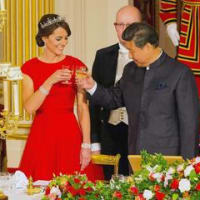
Nobel Peace Prize Awarded to Pakistan’s Malala Yousafzai, India’s Kailash Satyarthi
Committee Seeks to Draw Attention to Violations of Children’s Rights and Persistence of Child Labor
By SEAN MCLAIN, NIHARIKA MANDHANA and KJETIL MALKENES HOVLAND
Updated Oct. 10, 2014 11:15 a.m. ET
Indian children’s rights activist Kailash Satyarthi and Malala Yousafzai, a Pakistani teenager shot by the Taliban after campaigning for girls’ education, were awarded this year’s Nobel Peace Prize on Friday.
Pakistani student Malala Yousafzai and Indian children’s rights activist Kailash Satyarthi have been awarded the Nobel Peace Prize for their "struggle for education and against extremism." (Photo: Getty)
The joint honor came at the end of a week of cross-border violence between India and Pakistan that left 17 people dead and injured more than 100 others as the estranged neighbors’ forces traded mortar and small-arms fire.
With its decision, the Norwegian Nobel Committee sought to draw attention to the persistence of child labor in India and other poor countries and on limits imposed on women and girls by radical Islamists in Pakistan and elsewhere.
In its statement announcing the prize, the Norwegian Nobel Committee said it is “an important point for a Hindu and a Muslim, an Indian and a Pakistani, to join in a common struggle for education and against extremism.”
Nobel Prize Winners, 2014
Read more about the Nobel Prize winners.
Hindu-majority India and Muslim-majority Pakistan have fought three wars since gaining independence from Britain in 1947 after the partition of the South Asian subcontinent along religious lines.
Nobel committee chairman Thorbjørn Jagland said this year’s prize was unrelated to the current confrontation between the nuclear-armed rivals but, he said, “any contribution to resolving any conflict is of course good.”
In its prize citation, the committee said that 17-year-old Ms. Yousafzai, the youngest person so far to win the Nobel Peace Prize, had fought for girls’ rights to schooling “under the most dangerous circumstances.”
Ms. Yousafzai, who is now in Britain, couldn’t immediately comment because she was at school, according to Edelman, the public-relations firm representing her.
More
Yousafzai Rose to Prominence After Taliban Shooting
Satyarthi Hopes Win Draws Attention to Plight of Children
Malala Yousafzai’s Co-Author Says Nobel Peace Prize Richly Deserved
Q&A With Kailash Satyarthi
Malala Yousafzai’s Year in Photos (10/9/13)
In Swat, Battle for Girls’ Education Continues (10/9/13)
Mr. Satyarthi, who leads an Indian nonprofit, the Save the Childhood Movement, had shown “great personal courage” while “focusing on the grave exploitation of children for financial gain,” the Nobel committee said.
“This prize is a recognition and honor to hundreds and millions of children who are still languishing in slavery, who are still deprived of their childhood, their education, their health care, their fundamental rights,” Mr. Satyarthi told journalists crammed into his office in the Indian capital.
The 60-year-old Mr. Satyarthi, has for decades been a leading voice in the fight against child trafficking and forced labor in India. His organization, Save the Childhood Movement, says it has rescued 83,000 Indian children from servitude in India since 1981.
He also said that he thought the prize carried a pointed message. “I think it is a big statement from the Nobel committee,” he said. “It has to be read between the lines—not by the governments alone, but by the public in general, by every Indian citizen and every Pakistani citizen.
Globally, the incidence of underage work is declining, but remains widespread, with children toiling in brickyards, factories and as domestic servants. The United Nations says there were 168 million child workers in 2012—78 million fewer than in 2000.
India has over 280 million children between the ages of 5 and 14 years, according to the country’s 2011 census. Unicef says 12% of them are child laborers, though India’s official figures put the number as low as 1.5%, or about 4.3 million children.
Not all child labor is illegal in India, where the government imposes limits on the number of hours and kinds of work children can do. Poor-quality public education and families’ need for children’s wages are among the main reasons children leave school for the workforce, development groups say.
Asked Friday if he thought India’s government had failed the country’s children, Mr. Satyarthi said: “Absolutely, they have failed. Not just them, it is a collective failure of the international community.”
Life for Nobel Peace Prize winner Malala Yousafzai has never been particularly normal. WSJ’s Dipti Kapadia looks at Ms. Yousafzai’s life since she was shot in 2012. Photo: AP
Ms. Yousafzai rose to prominence in 2009 when she started writing an online diary about her experience living under the Taliban in the northern Swat valley in Pakistan.
She criticized restrictions on education for girls and became a campaigner for women’s rights and education, drawing the ire of the Pakistani Taliban. On Oct. 9, 2012, when she was on her way home from school, two gunmen stopped Ms. Yousafzai’s school van and shot in the head.
Fifteen years old at the time, she survived and—undeterred by the attack—has continued to campaign around the world to raise awareness about education.
“I think it’s absolutely fantastic,” said Christina Lamb, who co-wrote Ms. Yousafzai’s book, “I Am Malala.” “I don’t think it could’ve been given to a better person. She really is out there trying to make a difference and she risked her life for it, so that should be rewarded.”
The pair was honored by the Norwegian Nobel Committee for showing great personal courage in “their struggle against the suppression of children and young people and for the right of all children” to schooling.
The President of India, Shri Pranab Mukherjee, congratulated Mr. Kailash on the prize and his work aimed at abolishing child labor in India.
The Nobel Committee said Malala Yousafzai, left, and Kailash Satyarthi were awarded the prize for their struggle for child education. Getty Images
“The prize should be seen as recognition of the contributions of India’s vibrant civil society in addressing complex social problems such as child labor,” Mr. Mukherjee said.
The five-member Nobel Committee picked the winner out of a record 278 nominations that included former U.S. intelligence contractor Edward Snowden and Pope Francis.
The committee has come under fire in recent years for selecting winners such as the European Union in 2012 and President Barack Obama in 2009, but the 8 million-kronor ($1.1 million) cash award is still considered one of the most prestigious honors in the world.
This year’s winners were widely praised and regarded as being more in line with the traditional spirit of Alfred Nobel. “This is an excellent choice,” said Anna Ek, chairwoman for the Swedish Peace and Arbitration Society. “This is a way to acknowledge people who are trying to change the world with peaceful means on the grassroots level.”
Ms. Ek added: “there’s a very nice symbolism in sharing the prize jointly between an Indian and a Pakistani. Hopefully, this can be a positive injection in that conflict and put pressure on the leaders to approach each another.”
—Preetika Rana and Atish Patel in New Delhi and Jenny Gross in London contributed to this article.
------------------------------
[Jamawns' comment]
------------------------------
Dear Mr. Kailash Satyarthi,
Congratulation! I know your objective is not prize but activity, and I am glad to learn from you a lot.
Dear Ms. Malala Yousafzai,
Congratulation! I heard the Koran or Islamic principle said that BOTH MAN and WOMAN have to learn from academic studies/education and real lives.
However, some Islamic fundamentalists have prohibited women from studying at school. Such the Islamic fundamentalists' attitude has misled international citizens' feeling toward Muslims.
Muslims must speak loud that Islamic principle say that BOTH MAN and WOMAN have to learn from academic studies/education and real lives.
Committee Seeks to Draw Attention to Violations of Children’s Rights and Persistence of Child Labor
By SEAN MCLAIN, NIHARIKA MANDHANA and KJETIL MALKENES HOVLAND
Updated Oct. 10, 2014 11:15 a.m. ET
Indian children’s rights activist Kailash Satyarthi and Malala Yousafzai, a Pakistani teenager shot by the Taliban after campaigning for girls’ education, were awarded this year’s Nobel Peace Prize on Friday.
Pakistani student Malala Yousafzai and Indian children’s rights activist Kailash Satyarthi have been awarded the Nobel Peace Prize for their "struggle for education and against extremism." (Photo: Getty)
The joint honor came at the end of a week of cross-border violence between India and Pakistan that left 17 people dead and injured more than 100 others as the estranged neighbors’ forces traded mortar and small-arms fire.
With its decision, the Norwegian Nobel Committee sought to draw attention to the persistence of child labor in India and other poor countries and on limits imposed on women and girls by radical Islamists in Pakistan and elsewhere.
In its statement announcing the prize, the Norwegian Nobel Committee said it is “an important point for a Hindu and a Muslim, an Indian and a Pakistani, to join in a common struggle for education and against extremism.”
Nobel Prize Winners, 2014
Read more about the Nobel Prize winners.
Hindu-majority India and Muslim-majority Pakistan have fought three wars since gaining independence from Britain in 1947 after the partition of the South Asian subcontinent along religious lines.
Nobel committee chairman Thorbjørn Jagland said this year’s prize was unrelated to the current confrontation between the nuclear-armed rivals but, he said, “any contribution to resolving any conflict is of course good.”
In its prize citation, the committee said that 17-year-old Ms. Yousafzai, the youngest person so far to win the Nobel Peace Prize, had fought for girls’ rights to schooling “under the most dangerous circumstances.”
Ms. Yousafzai, who is now in Britain, couldn’t immediately comment because she was at school, according to Edelman, the public-relations firm representing her.
More
Yousafzai Rose to Prominence After Taliban Shooting
Satyarthi Hopes Win Draws Attention to Plight of Children
Malala Yousafzai’s Co-Author Says Nobel Peace Prize Richly Deserved
Q&A With Kailash Satyarthi
Malala Yousafzai’s Year in Photos (10/9/13)
In Swat, Battle for Girls’ Education Continues (10/9/13)
Mr. Satyarthi, who leads an Indian nonprofit, the Save the Childhood Movement, had shown “great personal courage” while “focusing on the grave exploitation of children for financial gain,” the Nobel committee said.
“This prize is a recognition and honor to hundreds and millions of children who are still languishing in slavery, who are still deprived of their childhood, their education, their health care, their fundamental rights,” Mr. Satyarthi told journalists crammed into his office in the Indian capital.
The 60-year-old Mr. Satyarthi, has for decades been a leading voice in the fight against child trafficking and forced labor in India. His organization, Save the Childhood Movement, says it has rescued 83,000 Indian children from servitude in India since 1981.
He also said that he thought the prize carried a pointed message. “I think it is a big statement from the Nobel committee,” he said. “It has to be read between the lines—not by the governments alone, but by the public in general, by every Indian citizen and every Pakistani citizen.
Globally, the incidence of underage work is declining, but remains widespread, with children toiling in brickyards, factories and as domestic servants. The United Nations says there were 168 million child workers in 2012—78 million fewer than in 2000.
India has over 280 million children between the ages of 5 and 14 years, according to the country’s 2011 census. Unicef says 12% of them are child laborers, though India’s official figures put the number as low as 1.5%, or about 4.3 million children.
Not all child labor is illegal in India, where the government imposes limits on the number of hours and kinds of work children can do. Poor-quality public education and families’ need for children’s wages are among the main reasons children leave school for the workforce, development groups say.
Asked Friday if he thought India’s government had failed the country’s children, Mr. Satyarthi said: “Absolutely, they have failed. Not just them, it is a collective failure of the international community.”
Life for Nobel Peace Prize winner Malala Yousafzai has never been particularly normal. WSJ’s Dipti Kapadia looks at Ms. Yousafzai’s life since she was shot in 2012. Photo: AP
Ms. Yousafzai rose to prominence in 2009 when she started writing an online diary about her experience living under the Taliban in the northern Swat valley in Pakistan.
She criticized restrictions on education for girls and became a campaigner for women’s rights and education, drawing the ire of the Pakistani Taliban. On Oct. 9, 2012, when she was on her way home from school, two gunmen stopped Ms. Yousafzai’s school van and shot in the head.
Fifteen years old at the time, she survived and—undeterred by the attack—has continued to campaign around the world to raise awareness about education.
“I think it’s absolutely fantastic,” said Christina Lamb, who co-wrote Ms. Yousafzai’s book, “I Am Malala.” “I don’t think it could’ve been given to a better person. She really is out there trying to make a difference and she risked her life for it, so that should be rewarded.”
The pair was honored by the Norwegian Nobel Committee for showing great personal courage in “their struggle against the suppression of children and young people and for the right of all children” to schooling.
The President of India, Shri Pranab Mukherjee, congratulated Mr. Kailash on the prize and his work aimed at abolishing child labor in India.
The Nobel Committee said Malala Yousafzai, left, and Kailash Satyarthi were awarded the prize for their struggle for child education. Getty Images
“The prize should be seen as recognition of the contributions of India’s vibrant civil society in addressing complex social problems such as child labor,” Mr. Mukherjee said.
The five-member Nobel Committee picked the winner out of a record 278 nominations that included former U.S. intelligence contractor Edward Snowden and Pope Francis.
The committee has come under fire in recent years for selecting winners such as the European Union in 2012 and President Barack Obama in 2009, but the 8 million-kronor ($1.1 million) cash award is still considered one of the most prestigious honors in the world.
This year’s winners were widely praised and regarded as being more in line with the traditional spirit of Alfred Nobel. “This is an excellent choice,” said Anna Ek, chairwoman for the Swedish Peace and Arbitration Society. “This is a way to acknowledge people who are trying to change the world with peaceful means on the grassroots level.”
Ms. Ek added: “there’s a very nice symbolism in sharing the prize jointly between an Indian and a Pakistani. Hopefully, this can be a positive injection in that conflict and put pressure on the leaders to approach each another.”
—Preetika Rana and Atish Patel in New Delhi and Jenny Gross in London contributed to this article.
------------------------------
[Jamawns' comment]
------------------------------
Dear Mr. Kailash Satyarthi,
Congratulation! I know your objective is not prize but activity, and I am glad to learn from you a lot.
Dear Ms. Malala Yousafzai,
Congratulation! I heard the Koran or Islamic principle said that BOTH MAN and WOMAN have to learn from academic studies/education and real lives.
However, some Islamic fundamentalists have prohibited women from studying at school. Such the Islamic fundamentalists' attitude has misled international citizens' feeling toward Muslims.
Muslims must speak loud that Islamic principle say that BOTH MAN and WOMAN have to learn from academic studies/education and real lives.










![[Sputonic] What's Behind Japan 'Wavering' Between Two Opposing Policies Towards Russia](https://blogimg.goo.ne.jp/image/upload/f_auto,q_auto,t_image_square_m/v1/user_image/7c/d8/c11144c8fd1ce7dd82fbe843c0d343a5.jpg)
![[Sputonic] Russia regrets Japan distorting WWII facts](https://blogimg.goo.ne.jp/image/upload/f_auto,q_auto,t_image_square_m/v1/user_image/57/06/793fc0e53452ae59778dc2d8ecbaa8ba.jpg)
![[WSJ] Taiwan’s Historic Election Set to Test China Ties](https://blogimg.goo.ne.jp/image/upload/f_auto,q_auto,t_image_square_m/v1/user_image/25/98/95904d9d578fce5f80ca404cf96bdcab.jpg)


![[WSJ] World War II Anniversary Opens Old Wounds in Japan Over How Much to Apologize (3/3)](https://blogimg.goo.ne.jp/image/upload/f_auto,q_auto,t_image_square_m/v1/user_image/19/28/6cbc12baf2a79a285750c1f78f53d33f.jpg)



※コメント投稿者のブログIDはブログ作成者のみに通知されます